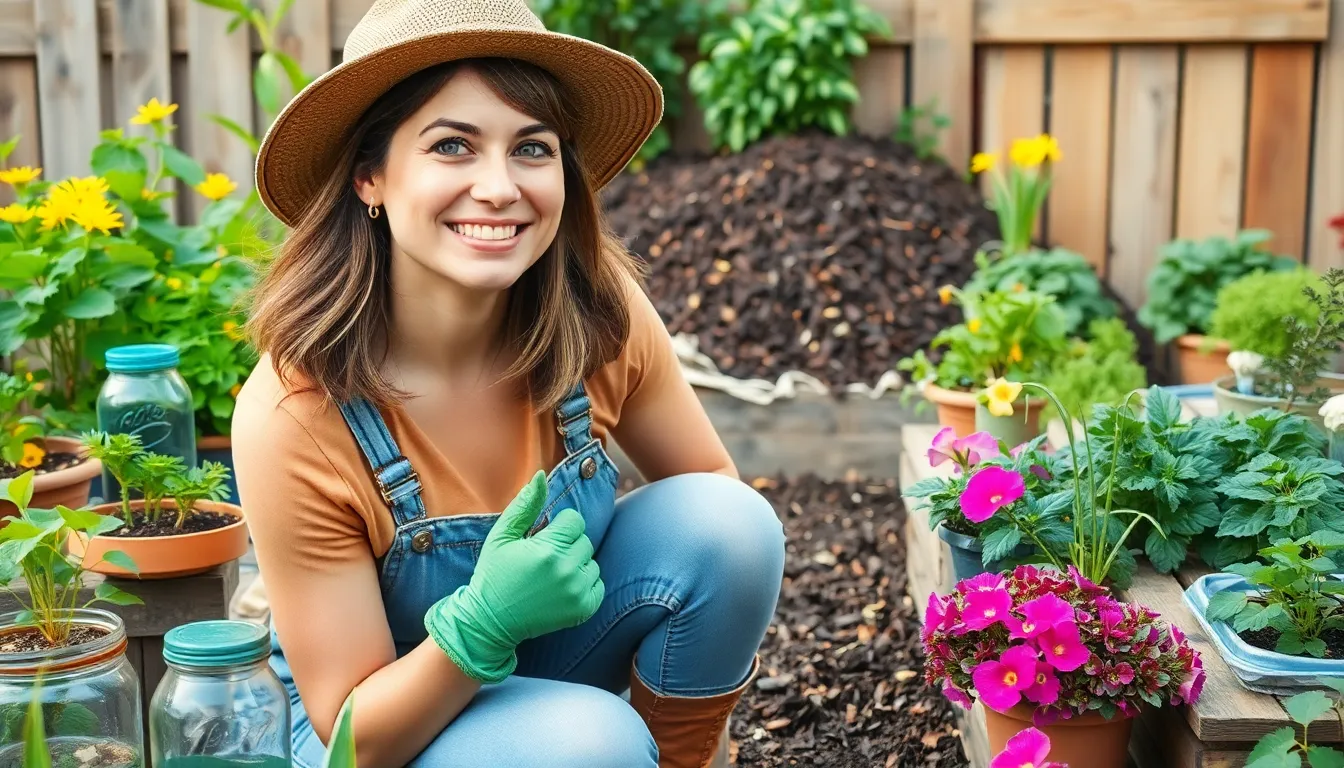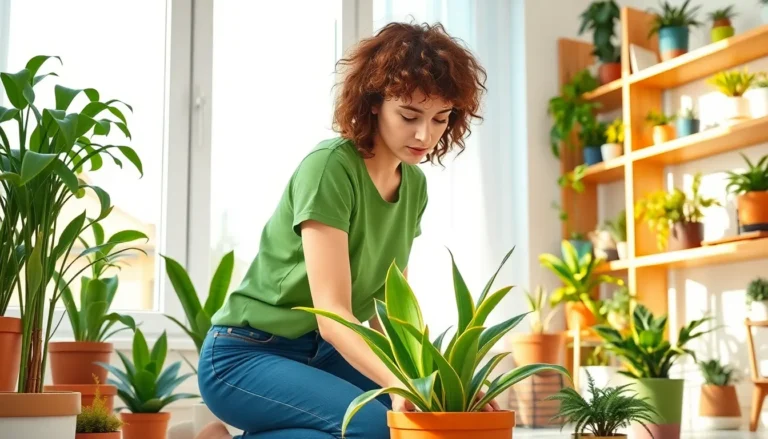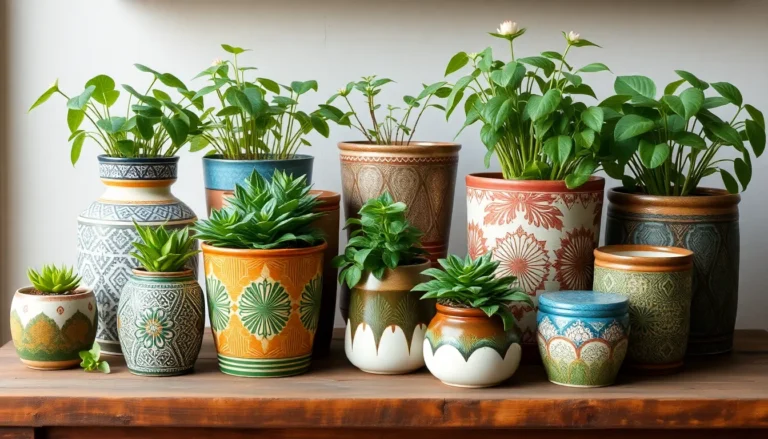In a world where plastic pots threaten to outlive us all, zero-waste plant care emerges as the eco-friendly hero we didn’t know we needed. Imagine nurturing your leafy companions while giving Mother Nature a high-five. It’s not just about keeping your plants alive; it’s about doing it with flair and sustainability.
Ditch the guilt of wasteful gardening practices and embrace a greener thumb. From repurposing kitchen scraps to crafting compost that even your plants would rave about, zero-waste plant care is the new black. Not only will your plants thrive, but you’ll also become the envy of your friends—because who wouldn’t want to be the trendsetter in eco-conscious living? Get ready to dig into a world where your gardening habits make both your plants and the planet smile.
Table of Contents
ToggleUnderstanding Zero-Waste Plant Care
Zero-waste plant care focuses on fostering plant health while reducing environmental waste. Adopting this approach involves implementing strategies that recycle resources and eliminate unnecessary waste in gardening.
Definition of Zero-Waste
Zero-waste encompasses methods aimed at minimizing waste through thoughtful practices. This concept encourages gardeners to use every part of a plant and its environment. For example, repurposing kitchen scraps as nutrient-rich compost demonstrates the essence of zero-waste. Utilizing materials that would otherwise end up in landfills highlights a sustainable approach. Collecting rainwater and using biodegradable pots also fits within this definition. Each element contributes to a holistic perspective on gardening that values resourcefulness.
Importance of Sustainable Gardening
Sustainable gardening serves as a crucial aspect of environmental stewardship. It enhances biodiversity by promoting healthy ecosystems. Growing plants without chemical pesticides or synthetic fertilizers reduces soil and water pollution. These practices also conserve natural resources and reduce carbon footprints. Adopting sustainable techniques inspires others to embrace eco-friendly habits. Encouraging local food production further underscores the positive impact on community health and resilience. Engaging in sustainable gardening leads to a healthier planet and supports future generations.
Essential Practices for Zero-Waste Plant Care

Adopting zero-waste practices enhances plant health and supports environmental well-being. By integrating simple techniques into gardening routines, individuals can minimize waste effectively.
Composting Kitchen Scraps
Composting kitchen scraps fosters a circular system that benefits both plants and the environment. Vegetable peels, coffee grounds, and eggshells serve as nutrient-rich additions to homemade compost. Creating a compost pile reduces landfill contributions and enriches soil quality. This practice not only recycles organic waste but also supports beneficial bacteria and microorganisms. Gardeners can improve their plants’ growth while actively reducing carbon footprints by using composted materials.
Using Recycled Materials
Using recycled materials in gardening promotes sustainability and reduces waste. Old newspapers, packaging materials, and glass jars make excellent planters or seed starters. Repurposed items like wooden pallets or crates can transform underutilized spaces into functional gardens. Utilizing these materials diminishes reliance on new products and minimizes environmental impact. Sustainable gardening fosters creativity while conserving resources, helping reduce overall waste production in plant care.
Tools and Resources for Zero-Waste Plant Care
Utilizing the right tools and resources can significantly enhance zero-waste plant care efforts. These items not only support sustainable gardening practices but also reduce unnecessary waste.
Eco-Friendly Gardening Tools
Selecting eco-friendly gardening tools ensures minimal impact on the environment. Options include stainless steel trowels and tools made from recycled materials. Biodegradable plant tags provide a practical choice for labeling. Natural fiber brushes or brooms can keep gardens tidy. Choose water-saving irrigation systems that utilize rainwater for efficient plant hydration. Prioritize tools designed for durability to lessen the need for replacements, further supporting zero-waste philosophy.
Recommended Reading and Online Communities
Exploring recommended reading can deepen knowledge about zero-waste gardening. Books like “Zero Waste Home” by Bea Johnson and “The Zero-Waste French Home” by Jérémie Pichon offer fantastic insights. Online communities foster connection and support among eco-conscious gardeners. Social media platforms host groups focused on sustainable plant care, where members share tips and resources. Websites like Zero Waste Collective provide articles about eco-friendly gardening practices. Engaging with these resources enhances skills while fostering a sense of community among zero-waste advocates.
Benefits of Adopting Zero-Waste Plant Care
Zero-waste plant care promotes sustainability by minimizing waste and benefiting the environment. Adopting this practice leads to various positive outcomes.
Environmental Impact
Implementing zero-waste practices significantly reduces landfill contributions. Collecting kitchen scraps for compost enriches soil quality while minimizing organic waste. Utilizing rainwater for irrigation conserves water resources effectively. Encouraging biodiversity becomes easier as native plants thrive in enriched environments. Avoiding single-use plastics lowers pollution levels in gardening. Practicing rotation of materials promotes a circular economy in plant care, where every part counts. Overall, these actions create a healthier ecosystem for future generations.
Economic Savings
Adopting zero-waste plant care results in substantial economic benefits. Using kitchen scraps for compost lowers purchasing costs for fertilizers and soil amendments. Repurposing materials such as containers or tools reduces the need for new purchases. Rainwater collection not only conserves water but also cuts down on utility bills for irrigation. Employing durable, eco-friendly tools can decrease replacement frequency, providing long-term savings. Ultimately, these practices foster a wallet-friendly approach that aligns with sustainable living.
Embracing zero-waste plant care not only nurtures a thriving garden but also contributes to a more sustainable future. By incorporating practices like composting and repurposing materials, gardeners can reduce waste while enhancing their plants’ health. This eco-friendly approach fosters creativity and resourcefulness, making gardening more enjoyable and impactful.
As individuals adopt these sustainable methods, they inspire others to join the movement towards a greener planet. The benefits extend beyond personal gardens, promoting community well-being and environmental stewardship. By prioritizing zero-waste principles, everyone can play a part in creating a healthier ecosystem for generations to come.






